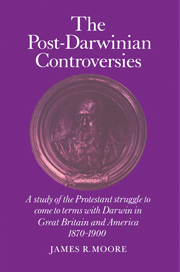 The Post-Darwinian Controversies
The Post-Darwinian Controversies Book contents
- Frontmatter
- Contents
- Dedication
- Preface
- PREFACE TO THE PAPERBACK IMPRESSION
- Introduction: the terrain of revision
- PART I HISTORIANS AND HISTORIOGRAPHY
- PART II DARWINISM AND EVOLUTIONARY THOUGHT
- PART III THEOLOGY AND EVOLUTION
- 9 Christian Anti-Darwinism: the realm of certainty and fixity
- 10 Christian Darwinisticism: the role of providence and progress
- 11 Christian Darwinism: the relevance of orthodox theology
- 12 Darwinism and Darwinisticism in theology
- Conclusion: on coming to terms with Darwin
- Dedication
- Notes to the text
- Bibliography
- Index
10 - Christian Darwinisticism: the role of providence and progress
Published online by Cambridge University Press: 22 January 2010
- Frontmatter
- Contents
- Dedication
- Preface
- PREFACE TO THE PAPERBACK IMPRESSION
- Introduction: the terrain of revision
- PART I HISTORIANS AND HISTORIOGRAPHY
- PART II DARWINISM AND EVOLUTIONARY THOUGHT
- PART III THEOLOGY AND EVOLUTION
- 9 Christian Anti-Darwinism: the realm of certainty and fixity
- 10 Christian Darwinisticism: the role of providence and progress
- 11 Christian Darwinism: the relevance of orthodox theology
- 12 Darwinism and Darwinisticism in theology
- Conclusion: on coming to terms with Darwin
- Dedication
- Notes to the text
- Bibliography
- Index
Summary
Pseudo-science…has grown and flourished until, nowadays, it is becoming somewhat rampant. It has…an army of ‘reconcilers’, enlisted in its service, whose business seems to be to mix the black of dogma and the white of science into the neutral tint of what they call liberal theology.
T.H. Huxley, 1887Only those who could inject spiritual dimensions into Darwinism could directly come to terms with it. For others, Darwinism produced conflicts in which the real issue was frequently obscured. In essence, one can say that Darwinism could be reinterpreted or transformed.
John DillenbergerIn the polemical world of T. H. Huxley liberal reconcilers of Christianity and evolution could be nothing but an ‘army’ bent on blending scientific truth with theological error. Their exploits were simply ‘pseudo-science’, the neutralising of issues as plain as black and white. Huxley was of course mistaken, though his caricature has persisted in a military metaphor. The reconcilers did not always confront clear-cut issues, much less did they blur them. One might well argue that they ‘engaged the advance lines of the realistic modern mind’, but to chide them for a ‘strange insensitiveness to all the implications of science’ and for a delusive belief that they had ‘made contributory to their faith the grand army of scientific inquiry’ seems altogether unjust. Scientists themselves, most of whom were overtly religious, could hardly agree on the theological ‘implications’ of their theories. The ‘grand army of scientific inquiry’ never did exist.
- Type
- Chapter
- Information
- The Post-Darwinian ControversiesA Study of the Protestant Struggle to Come to Terms with Darwin in Great Britain and America, 1870-1900, pp. 217 - 251Publisher: Cambridge University PressPrint publication year: 1979


